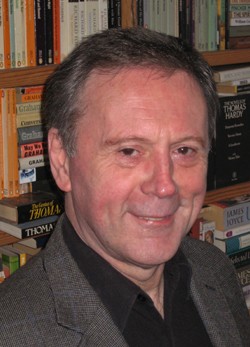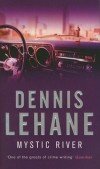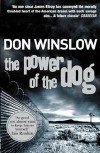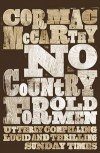
 Classics in September — Today it’s a great honour to bring you one of Britain’s most knowledgeable crime fiction commentators. The author of Death in a Cold Climate: A Guide to Scandinavian Crime Fiction and The Rough Guide to Crime Fiction, Barry Forshaw also makes documentaries on the topic for the BBC, appears at crime writing festivals around the country and edited Crime Time magazine. We asked him to join us for our month of classics and talk about some of his personal favourites. And now it’s over to Barry…
Classics in September — Today it’s a great honour to bring you one of Britain’s most knowledgeable crime fiction commentators. The author of Death in a Cold Climate: A Guide to Scandinavian Crime Fiction and The Rough Guide to Crime Fiction, Barry Forshaw also makes documentaries on the topic for the BBC, appears at crime writing festivals around the country and edited Crime Time magazine. We asked him to join us for our month of classics and talk about some of his personal favourites. And now it’s over to Barry…
Rather than reach back farther into the past, I decided to look at some of the key crime novels of the first decade of the 21st century. A challenging task, given that so many highly accomplished books appeared in the first 10 years of the new century.
But here goes:
 Nineteen Seventy-Seven by David Peace (2000)
Nineteen Seventy-Seven by David Peace (2000)
Peace’s gritty and pungent novel Nineteen Seventy-Seven is the second book in his much-acclaimed Red Riding Quartet. Like its predecessor, the book trenchantly evokes the period and the corruption that was endemic in the police force during that time. Peace’s protagonists, conflicted copper Bob Fraser and cynical journo Jack Whitehead, are the reader’s conduits through a society where justice is always ephemeral. Peace’s childhood in Ossett during the hunt for the Yorkshire Ripper left him with memories that continued to plague him and provided the basis and inspiration for the Red Riding Quartet.
UK Amazon US Amazon
 Mystic River by Dennis Lehane (2001)
Mystic River by Dennis Lehane (2001)
Ambitious novels such as Darkness, Take my Hand and Gone, Baby, Gone made Lehane’s reputation; these were books noted for their taut-yet-complex storylines and richly drawn protagonists. Mystic River consolidated his status as a major American talent. Childhood friends Sean, Jimmy and Dave have their destinies transformed when a car arrives in their street. One boy gets into the car and a terrible event follows which ruptures their friendship and changes their lives. Twenty-five years later, Sean has become a homicide detective, while Jimmy has turned to crime. As both a complex psychological thriller and a state-of-the-nation novel, this is powerful fare.
UK Amazon US Amazon
 The Power of the Dog by Don Winslow (2004)
The Power of the Dog by Don Winslow (2004)
Winslow remains one of the unsung giants of the crime-writing genre, painting on a massive canvas in his arm-straining drug wars epic, The Power of the Dog. He followed this with The Winter of Frankie Machine, a more straightforward narrative set in California’s Orange County, but his magnum opus is the earlier book. In The Power of The Dog, drug dealers and their police pursuers perform a choreographed dance of mayhem in a generation-spanning chronicle of the Mexican-American drug wars. Perhaps influenced by the unmatchable drug novels of Robert Stone, this is crime writing on an epic scale – and it’s a book Winslow has never subsequently equalled.
UK Amazon US Amazon
 No Country for Old Men by Cormac McCarthy (2005)
No Country for Old Men by Cormac McCarthy (2005)
Cormac McCarthy is now sui generis among American writers; his blood-boltered, lacerating narratives offering a cumulative picture of his country – from its lawless past to its bleak future – that has no equal. McCarthy has utilised the violent tropes of the crime novel, most strikingly in No Country for Old Men (subsequently filmed with Javier Bardem). Its grotesque psychopath, Anton Chigurh, is one of the few memorable monsters in modern fiction, cutting a swathe through innocent and guilty alike in pursuit of stolen money on the Tex-Mex border, and – to the frustration of many readers – getting away with it mostly unscathed.
UK Amazon US Amazon
 The Broken Shore by Peter Temple (2006)
The Broken Shore by Peter Temple (2006)
Temple received the 2007 Crime Writers’ Association Dagger for The Broken Shore, instantly marking out (for those who didn’t know it existed) a rich Antipodean arm of the crime fiction genre that made most contemporary writing in the field seem thin and etiolated, as dispossessed copper Joe Cashin, relocated to the countryside, deals with the murder of a local businessman. All the things that make Peter Temple’s books such pleasurable experiences are here: the steady, satisfying unravelling of a mystery, the gallery of idiosyncratic characters, most notably the beleaguered – and conflicted – protagonist.
UK Amazon US Amazon
Below, you can grab an array of Barry Forshaw’s books including Death in a Cold Climate: A Guide to Scandinavian Crime Fiction, The Rough Guide to Crime Fiction and Guns for Hire: The Modern Adventure Thriller. Watch for his upcoming releases too – British Crime Film and Nordic Noir.









One I would include would be The James Deans by Reed Farrel Coleman. Great writing, big themes and a real emotional punch. More recent Moe Prager mysteries have not matched that standard and perhaps the series should have finished there.